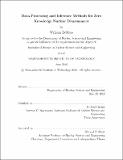Data processing and inference methods for zero knowledge nuclear disarmament
Author(s)
DeMaio, William (William Aloysius)
DownloadFull printable version (4.571Mb)
Other Contributors
Massachusetts Institute of Technology. Department of Nuclear Science and Engineering.
Advisor
R. Scott Kemp.
Terms of use
Metadata
Show full item recordAbstract
It is hoped that future nuclear arms control treaties will call for the dismantlement of stored nuclear warheads. To make the authenticated decommissioning of nuclear weapons agreeable, methods must be developed to validate the structure and composition of nuclear warheads without it being possible to gain knowledge about these attributes. Nuclear resonance fluorescence (NRF) imaging potentially enables the physically-encrypted verification of nuclear weapons in a manner that would meet treaty requirements. This thesis examines the physics behind NRF, develops tools for processing resonance data, establishes methodologies for simulating information gain during warhead verification, and tests potential inference processes. The influence of several inference parameters are characterized, and success is shown in predicting the properties of an encrypting foil and the thickness of a warhead in a one-dimensional verification scenario.
Description
Thesis: S.B., Massachusetts Institute of Technology, Department of Nuclear Science and Engineering, 2016. This electronic version was submitted by the student author. The certified thesis is available in the Institute Archives and Special Collections. Cataloged from student-submitted PDF version of thesis. Includes bibliographical references (pages 63-64).
Date issued
2016Department
Massachusetts Institute of Technology. Department of Nuclear Science and EngineeringPublisher
Massachusetts Institute of Technology
Keywords
Nuclear Science and Engineering.